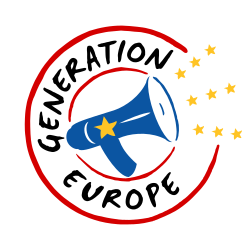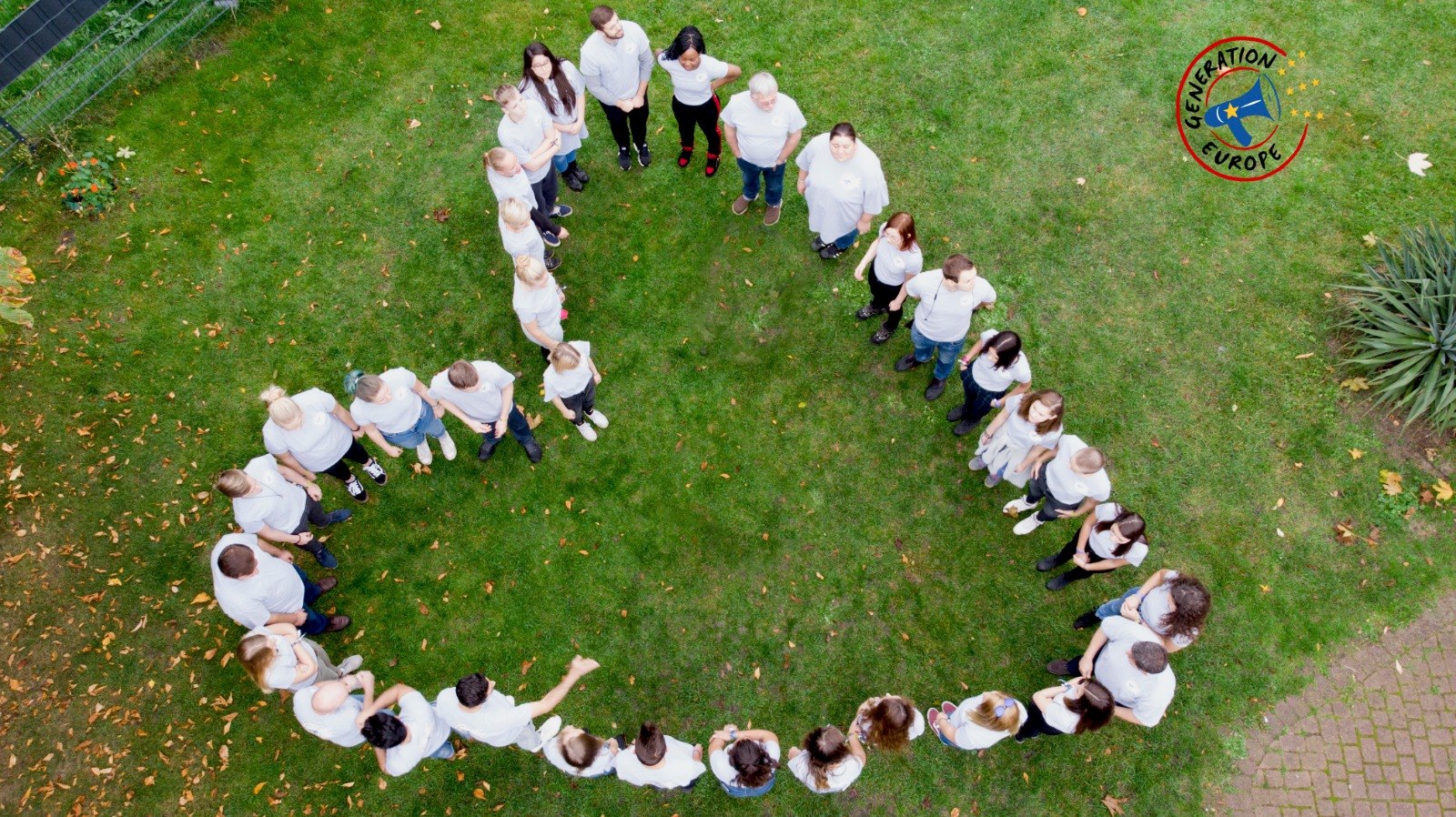
Wow, what a great start: In the autumn/winter of 2018 the first ten youth encounters took place as part of the Generation Europe network. More than 200 youths from 15 countries were active in: Belarus, Germany, Greece, Italy, Spain, and the Czech Republic. How that looked like, and what precisely they did there, can be seen here.
1. RE-FLECT – Human Rights and Democracy
Youth encounter 20.10.-31.10.18 in Bochum (Germany)
- Jugendamt der Stadt Bochum (Bochum/Germany)
- GARE (Évora/ Portugal)
- META Cooperativa Sociale (Rom/Italy)
The participants discussed and reflected the concepts of democracy and human rights among them – in how it relates to their personal living environment. In this, they learned to recognise and describe problems, and compare them with other’s experiences. The goal was a shared development of problem-solving strategies. As part of a Bochum “Action Week”, the youths from three countries were active in Bochum together, and shared their views with other youths from Bochum. They took interviews, produced a video, and documented their results. Additionally, there were meetings with local stakeholders and politicians.
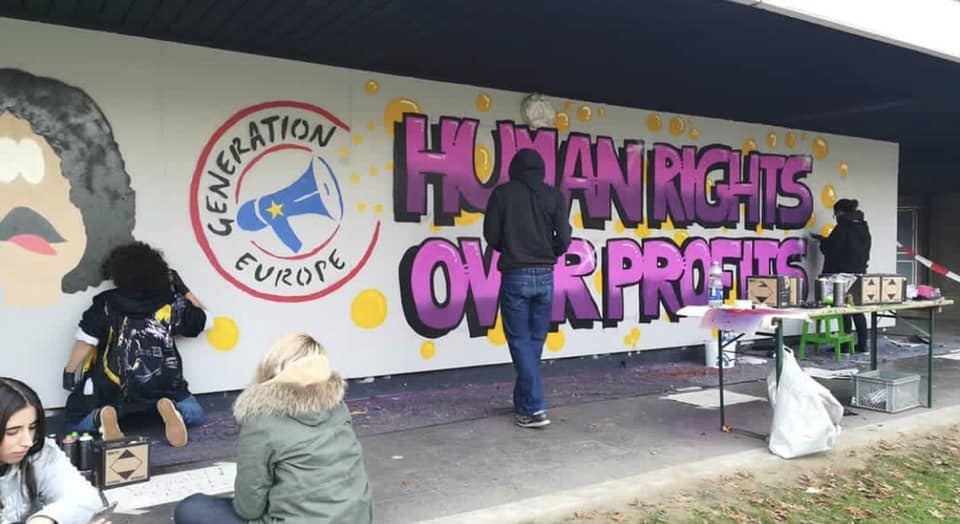
“Generation Europe” – The song produced by the partnership
Jugendliche aus Europa führen Dialog in Bochum (WAZ, 20.10.18)
2. Steps for Participation
Youth encounter 05.10.-16.10.18 in Picasent (Valencia)
- EUROPABÜRO im Kreisjugendamt Steinfurt (Steinfurt/Germany)
- Youth centre Telsiai (Telsiai/Lithuania)
- Asociación Opendoors (Quart de Poblet/Spain)
Together the youths dealt with the question of hat participation means on a personal level and what socio-political relevance such participation in civil life may have. There were workshops, excursions and walks, meetings with the local administration and with associations of civil society, as well as a visit to the regional youth councilor. The goal: Exchange on problems and challenges, showing one’s face, getting active. And all of this in a European context.
Generation Europe arriba a Picassent (Valencia Extra, 10.10.18)
3. Inclusion in Action
Youth encounter 27.10.-07.11.18 in Minsk (Belarus)
- Werkstatt im Kreis Unna (Unna/Germany)
- Risorsa Europa (Pontinia/Italy)
- Nash Sled (Minsk/Belarus)
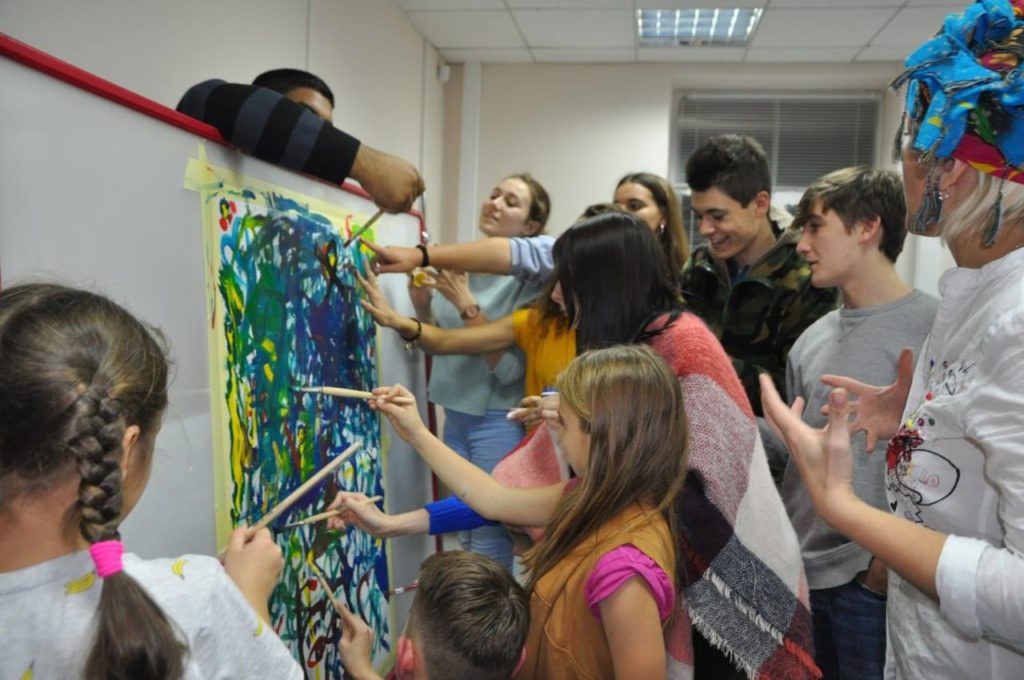
The youth encounter took place in the EcoTechnoPark „Volma“, around 40 kilometres from Minsk. The participants aged between 16 and 20 years took part in trainings, workshops and the youth hackathon “Augment your reality”. For this they charted accessible and not yet accessible spaces in Minsk. With regard to content, the focus was on the topics of human rights, Active European Citizenship, participation, environmental protection as well as the inclusion of people with disabilities. The active youths met experts and learned about being active citizens in a digital society.
4. This land is your land, this land is my land?
Youth encounter 16.10.-27.10.18 in Gelsenkirchen/Oberhausen (Germany)
- Kinder- und Jugendtreff ParkHaus (Oberhausen/Germany)
- MTÜ Noored Toredate Mötetega (Tartu/Estonia)
- Outward Bound Romania (Tigru Mures/Romania)
Youths from three countries developed new ideas for democratic community life: They discussed their personal role in their local societies and in Europe, in order to then expand to and deal with the topics of human rights, reasons for migration, and intercultural learning. During excursions, meetings, and discussions with NGOs, politicians and other actors in civil society, they continued this examination and expanded it with further perspectives. This exchange should be a basis for local projects, which, during the course of the partnership, will be implemented by the groups at their respective home locations.
Generation Europe Partnership 4 on Facebook
Generation Europe Partnership 4 on Instagram
Das Jugendzentrum Parkhaus ist Teil der „Generation Europe“ (WAZ, 30.10.18)
5. Young Democracy in Action
Youth encounter 17.10.-28.10.18 in Adamov (Czech Republic)
- SJD – Die Falken Düsseldorf (Düsseldorf/Germany)
- Oulun Nuoret Kotkat (Oulu/Finland)
- Be international (Brno-Řečkovice/Czech Republic)
The youth encounter took place in Brno, the Czech Republic’s second-largest town. Youths from the three countries split into three groups and dealt with the topics of democracy, human rights, and Active European Citizenship. For this they used methods of non-formal education: Brainstorming, discussions, group work, role playing, reflection, meetings with representatives of civil society, etc.
Generation Europe Partnership 5 on Facebook
Generation Europe Partnership 5 on Instagram
6. No Waste
Youth encounter vom 25.11-6.12.18 in Florence (Italy)
- ROOTS & ROUTES Cologne e.V. (Cologne/Germany)
- SMouTH (Larisa/Greece)
- Centro di creazione e cultura (Florence/Italy)
No Waste – the topic of the youth encounters was open to interpretations. It was about recycling, but also about the use of waste in art and in everyday life, on a social level as well as in a figurative sense. The participants were stimulated by theoretical approaches, games, as well as artistic activities. As part of the encounter, art and pedagogy were combined this way. Together, the active participants created open and safe spaces where young people could meet at eye level in order to gain the necessary confidence. They were encouraged to articulate and reflect on their individual identity as well as on that of their cultural group – thereby becoming protagonists of their own future and the future of their communities. Photos from Rebecca Lena:
“Generation Europe”, evento conclusivo al PARC Performing Arts Research Centre
Έναρξη εργασιών στη Λάρισα για το πρόγραμμα νέων «Generation Europe» (larissanet.gr, 25.10.2018)
7. Generation Europe in Greece
Youth encounter 10.12.-21.12.18 in Kalamata (Greece)
- EJB Weimar (Weimar/Germany)
- Youth Coop (Lisbon/Portugal)
- EUphoria (Athens/Greece)
Generation Europe: Εφηβοι από Γερμανία και Πορτογαλία στην Καλαμάτα (eleftheriaonline.gr, 14.12.2018)
Η ΒΟΝΙΤΣΑ ΣΤΟ “GENERATION EUROPE” (newsnowgr.com, 26.10.18)
8. Free Republic at Goldensee
Youth encounter vom 27.10.-10.11.18 in Groß Thurow
- Alte Schule e.V. (Buchholz/Germany)
- Base 4000 (Roskilde/Denmark)
- German-Ukrainian Society for Youth Work (Kyiv/Ukraine)
The youth meeting took place at the historically important location of the Goldensee memorial. The buildings once were used as barracks for GDR border troops. The location offers many opportunities for dealing with topics like borders, values and democracy. Role-playing on the topics of uniforms, control, power, economy, politics or culture further deepened the involvement, just like the excursion to the Neuengamme concentration camp memorial site and Grenzhus Schlagsdorf. The participants highlighted their differences and similarities in culture, politics and religion, in order to then – after an intensive preparation process – proclaim the “Free Republic at Goldensee” on the 9th of November 2018. The 9th of November was chosen deliberately to commemorate several historical events: the proclamation of the First German Republic in 1918, the “Night of Broken Glass” in 1938 and the Fall of the Berlin Wall in 1989. Proclaiming the “Free Republic at Goldensee” on the 9th of November was an artistic performance, which the activists also used to enter into dialogue with personalities from culture, politics and administration as well as other interested actors. During the preparations for the action, the young people created their own image of a free, active, and democratic Europe, taking into account the different perspectives and social and personal backgrounds of the participants. The decision-making process made democratic processes directly accessible to the young people in the international group.
Generation Europe Partnership 8 on Facebook
Freie Republik am Goldensee ausgerufen (Lübecker Nachrichten, 9.11.2018)
9. Generation Europe in Brandenburg
Youth encounter vom 18.-27.11.18 in Luckenwalde
- SJD – Die Falken Brandenburg (Luckenwalde/Germany)
- Szubjektiv (Budapest/Hunagry)
- Esplora (Itri/Italy)
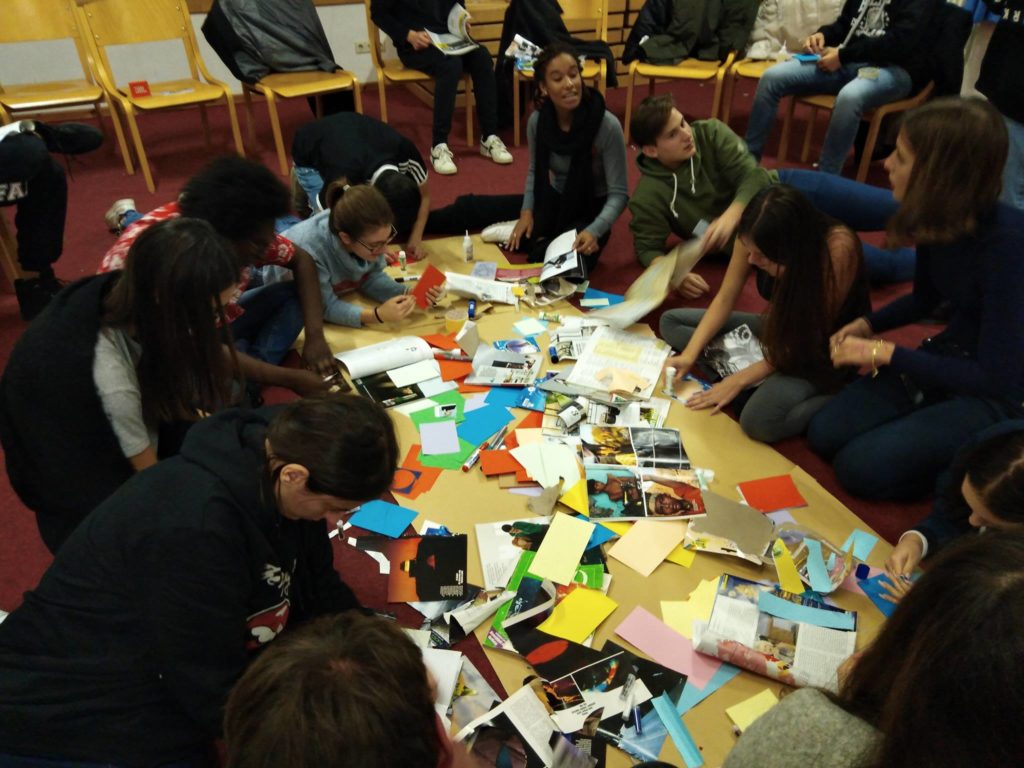
The youths from Germany, Hungary and Italy dealt with the topics of racism, human rights and democracy. Among other events, they were active in the youth centre “Klab” in Luckenwalde and got to know the work there. During the activities, discussions on flight and migration played a special role. In Berlin, 70 kilometres away, the participants* developed a city tour on the subject of past and present democracy themselves. The overall goal of the youth encounter was to create a protected framework enabling reflection on oneself and society, in order to develop methods for improving local conditions on the basis of one’s own experiences.
Generation Europe Partnership 9 on Facebook
Generation Europe Partnership 9 on Instagram
Da Gaeta a Berlino, gli studenti del Fermi per il progetto Generation Europe (h24notizie, 30.11.18)
10. Generation Europe in Munich
Youth encounter vom 26.10.-06.11.2018 in Munich
- Landeshauptstadt München – Pädagogisches Institut (Munich/Germany)
- Irenia, Peace Games (Barcelona/Spain)
- Fundacja Borussia (Olsztyn/Poland)
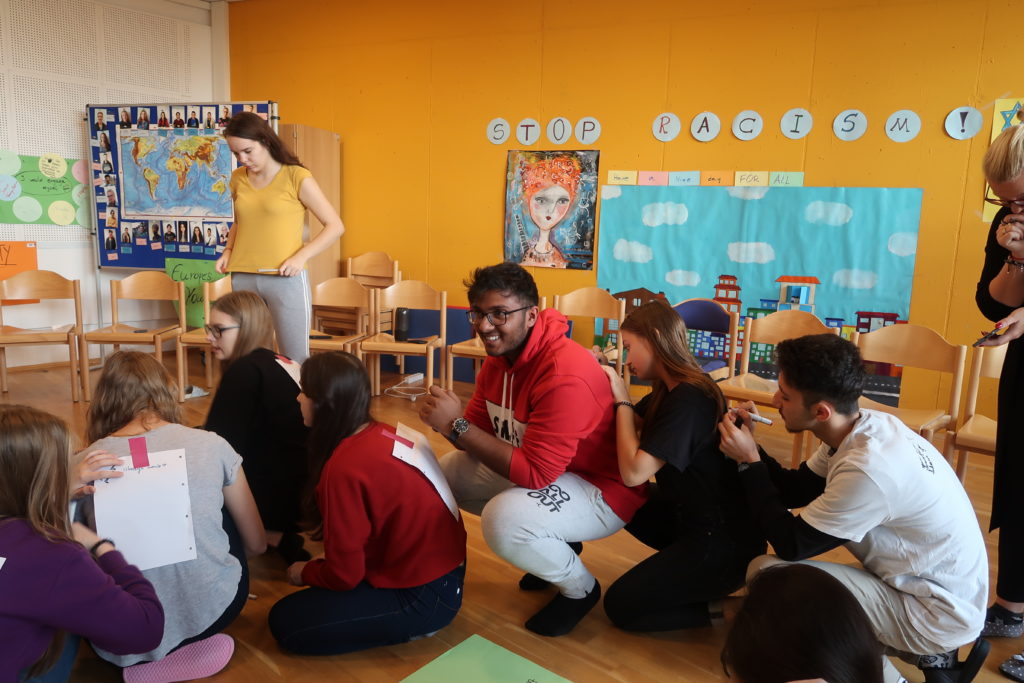
The cultural-pedagogical association SprachBewegung e.V. provided the pedagogical concept for this international youth encounter. The active participants used the medium of theatre, among others, to deal with current political issues. Additionally, they dealt with the history of the White Rose resistance movement, and developed their own leaflets, which they used to enter into dialogue with the local Munich population. As part of a direct campaign at the University of Munich, the activists promoted human rights and civil courage. The participants were able to decide on the topics and objectives of their activities themselves, while educational staff was responsible for the process. In order to make the project visible and effective in its local environment, there were meetings with local politicians and institutions. Furthermore, the districts where local participants live also became an important part of the programme. One of the other important goals of this first youth encounter as part of the project partnership was creating a trusting atmosphere between all participants and to establish cooperative routines. The participants also developed an awareness of their similarities, differences and cultural stereotypes and discussed how to reduce the latter.
